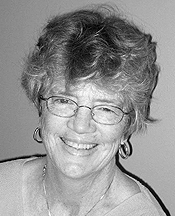Q&A: Reeve Lindbergh (Forward from Here: Leaving Middle Age-and Other Unexpected Adventures)
 In her new book, Forward from Here: Leaving Middle Age—and Other Unexpected Adventures (LJ 4/15/08), Reeve Lindbergh presents essays that gracefully reflect the skills of a woman accomplished as a novelist and children's book author, as well as a memoirist about her famous parents. From her longtime home in Vermont, she reflected on her latest work.
In her new book, Forward from Here: Leaving Middle Age—and Other Unexpected Adventures (LJ 4/15/08), Reeve Lindbergh presents essays that gracefully reflect the skills of a woman accomplished as a novelist and children's book author, as well as a memoirist about her famous parents. From her longtime home in Vermont, she reflected on her latest work.
Your essays read like relaxed yet honest conversations with a friend. Tell us about your writing process.
You have described my writing process perfectly! I love to write as if I am having a conversation with someone I know very well and can trust completely (no formality needed, no pretense possible)—even if it's just me. In this book it was mostly a matter of trying to observe and understand my own life day by day, experiences, thoughts and reflections, memories, feelings. I write my books very slowly but keep a journal fairly regularly and rely on my journal writings in the process of creating a book. I don't write every day, and sometimes I write only a paragraph or even a couple of lines at a time, but doing this keeps me connected to my thoughts with some kind of freshness and honesty, two qualities I value almost more than anything else in my writing.
In the book's first essay, "Hippies in the Hot Tub," you describe your migration—philosophical as well as geographical—to rural New England in the 1970s, and in "Aging" you write that you "used to see...life as an enormous self-improvement project, a work perpetually in progress." How do you see writing about your life, past and present, as affecting your own future or that of your readers?
The "Hippies-In-The-Hot-Tub" chapter was wonderful fun to write because it connected so many times in my life, but I hope readers will simply enjoy the fun of it and perhaps remember many forgotten times in their own lives because of it. I'm not really trying to inspire so much as to encourage and comfort my own contemporaries, as they have encouraged and comforted me with their friendship, with those conversations you mention, and just by the way they live their lives with love and humor and common sense and courage, especially as we all get older.
Your mother, Anne Morrow Lindbergh, published several memoirs during her life. Did she, as a writer, influence your life distinctly from her influence as a mother? Do you compare your writing self to her, or is that the sort of thing only third parties might do?
My mother's influence suffuses my life—is that the word I want?—in every possible way. I'm not sure that I can separate the "mother" influence from the "writer" influence, but I still feel that she is part of everything I do in both spheres. I don't for a minute believe I have her grace, her erudition, or her extraordinary skill as a writer even in terms of sheer craftsmanship, but I may have a little echo of her voice in my work. That would be a natural outcome of her deep and ongoing presence in my life, and I suspect this is why people who know her books sometimes think of her when they read mine.
You mention libraries several times in your book, including working in the writer's room in your local library. What do you think of predictions that public libraries will someday become extinct?
Oh dear. Yes, I've heard these predictions once or twice, and I think they are, frankly, baloney. The predictors need to visit their 21st-century public library! Of course, libraries are not the books-for-borrowing repositories people imagine them to be, 19th-century throw-backs (and they weren't just book repositories even then, but that's another story). They still provide books and magazines and research material to the public—free!—but libraries are also at the frontier of Internet communication. They provide all those kinds of services, too, and have for decades. Libraries are ahead of the times, not behind them (and did you ever try to take an e-book to read in the bath-tub?).
Add Comment :-
RELATED
ALREADY A SUBSCRIBER? LOG IN
We are currently offering this content for free. Sign up now to activate your personal profile, where you can save articles for future viewing








